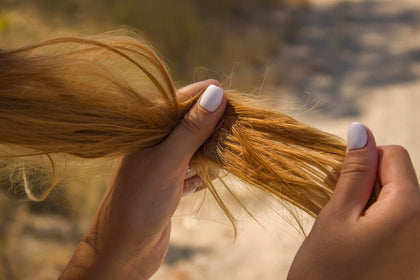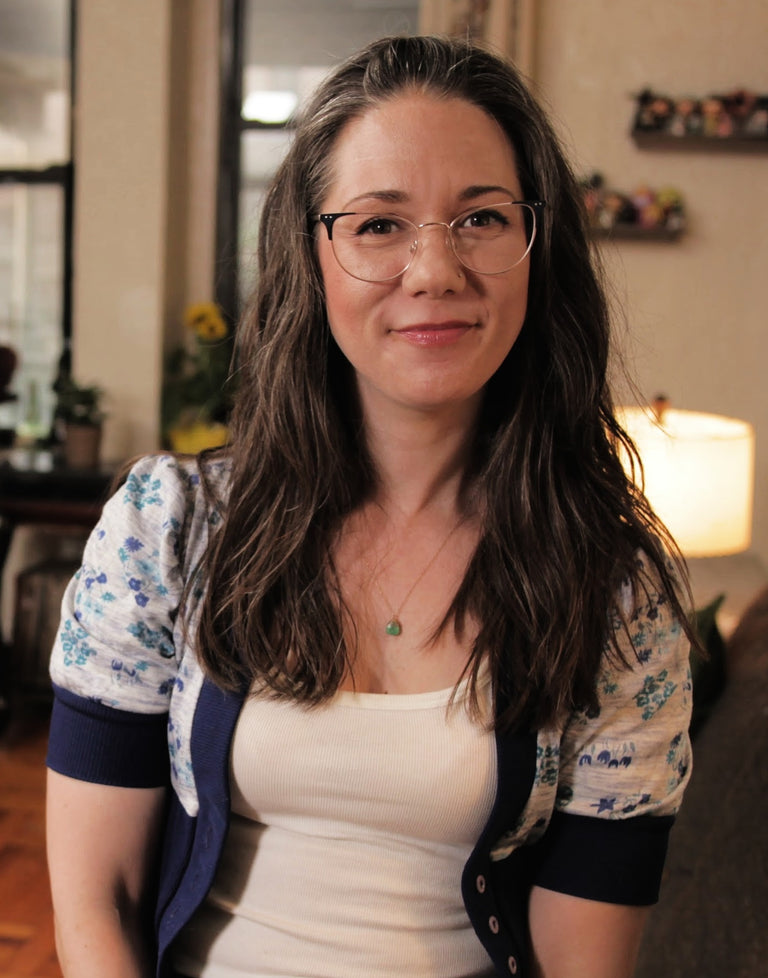If your hair is looking lackluster, dull and frizzy, you might be dealing with brittle hair. Brittle hair can be a sign that your locks are stressed and could even signal underlying health issues.
Keep reading to get the full scoop on identifying dry, brittle hair, along with expert tips for dealing with it — plus what product you should use to restore your hair's healthy appearance and texture.
What Does Brittle Hair Look Like?
Hair becomes dry when it’s stripped of the natural oils that keep it moisturized, but brittle hair is hair that’s been chronically dry and has become damaged.
“Dry, dull, frizzy, broken, split-ended and lackluster hair are all symptoms of brittle hair,” said Lilly Will, founder and CEO of NiaWigs.
Each strand of hair is composed of layers. When your hair is healthy, natural oils and moisturizers from products sit on the outer layer, called the cuticle, to help protect the inner layers. When your hair is dry and brittle, the cuticle breaks down. This is what leads to frizz, dullness and hair breakage.
“Most of the time, brittle hair is hair that is very dehydrated, has no elasticity left to stretch or bend, and it will break and fray easily,” added Madison Dufour, hairstylist at The Exquisite Find.
In other words, hair that is simply dry will typically have more resilience and bounce than brittle strands. “You know your hair is brittle when you see split ends and find broken pieces of hair everywhere you sit, on the floor and on your clothes," said Dr. Gaby Longsworth, a certified hair practitioner, Ph.D. scientist and founder of Absolutely Everything Curly. "It also feels slimy like seaweed or spongy when wet."
What Causes Brittle Hair?
At the root of brittle hair is excess and prolonged dryness. Here are some of the factors that could contribute to hair becoming brittle.
Aging
Dry hair can happen at any age, but you’re more likely to develop it as you get older. Genetics, oxidative stress on the hair follicles and hormonal changes are just some of the ways that aging could cause hair to become more dry and brittle over time.
Hair Care and Styling Products
It probably comes as no surprise that your hair care and styling routines can damage hair. Regular use of a curling iron, flat iron or blow dryer can cause hair damage, eventually leading to brittleness and breakage. Ditto for chemical treatments. Additionally, color-treated hair can often be dry or brittle. Any of your hair care products might also contain drying and potentially damaging ingredients like sulfates, parabens and alcohols — so read those labels!
More: 9 Ingredients in Shampoo To Avoid (And What to Look for Instead)
Nutritional Deficiencies
“Certain mineral and vitamin deficiencies cause brittle, splitting or thinning hair (and nails),” said Dr. Longsworth. Nutritional deficiencies can happen when you’re not eating a healthy or balanced diet, but they might also be caused by other medical conditions like anorexia nervosa.
“A lack of biotin (vitamin B-7) is one such deficiency, along with low levels of iron, zinc, selenium, vitamin C, A and D, all of which can cause brittle hair,” said Longsworth. “Protein deficiency can also lead to brittle hair."
Hormonal Changes
Hormonal changes, such as menopause, changes in birth control, pregnancy and childbirth, might also contribute to changes in hair density and texture. Thyroid issues, whether it be hyper or hypothyroidism, might also cause brittle hair, according to Dr. Yasmin Akhunji, a board-certified endocrinologist with Paloma Health.
“Your hair follicles may not be stimulated as much as they need when the thyroid starts to overproduce or underproduce hormones,” she explained. “This thyroid hormone imbalance can result in hair loss or dry, brittle hair — including body hair or eyebrows.”
Shop: Shea Whitney's VEGAMOUR Picks
Environment
Cold or dry climates and seasonal changes can cause dry skin and hair, but even in sunnier and warmer climates, you could dry hair out with regular exposure to chlorine in swimming pools, salt water or excessive UV exposure when in the sun.
Should I See a Doctor for Brittle Hair?
“Basically, brittle hair is a warning sign that your hair (and possibly your health) is in bad shape,” said Dr. Longsworth. So if you’re noticing brittle hair and you aren’t sure why — or if you’ve changed your hair care routine and still aren’t seeing improvements — it’s best to see a doctor to rule out any underlying health conditions.
How To Care for Dry, Brittle Hair
Dry, brittle hair needs some extra love and care! Here are several tools you can add to your toolkit for achieving holistic hair wellness.
Get Regular Haircuts
This might seem like a bummer if you’re trying to grow out your hair, but regular cuts and trims are going to benefit the look of your hair in the long run. Getting regular haircuts or trims will help get rid of the damaged hair and make your mane look all-around healthier.
Minimize Heat Styling
If you’re using hot tools on the regular, try to cut back. And if you’re trying to soothe brittle hair that isn’t related to overexposure to heat styling, you should still avoid it when you can. When you are heat styling, choose lower heat settings and always use a heat protectant beforehand to prevent heat damage.
Don’t Wash Every Day
If your scalp isn’t oily and you can manage without washing your hair every day, experts agree that even without brittle hair to deal with, it’s best to avoid daily washing. Washing strips natural oils and moisture from your hair, and washing daily can be excessive. Try incorporating a gentle dry shampoo into your routine on the days you don’t wash your hair, and when you do, use a cooler water temperature to avoid overstripping hair.
Change Up Your Products
It’s worth taking stock of the ingredients in your hair care products. Synthetic ingredients like sulfates, parabens, phthalates and silicon can all do more harm than good, while clean beauty products with natural and hydrating ingredients will actually support hair health and wellness.
For brittle, dry hair, consider VEGAMOUR's variety of shampoo and conditioner duos, which all feature Karmatin™, our proprietary vegan keratin that bonds to hair and doesn't rinse out. These cleansing and conditioning formulas instantly adjust to your hair on contact, providing the perfect amount of moisture, volume and protection, while enhancing color and shine.
Deep Condition Regularly
When hair is dry and brittle, it’s time to pull out all the stops. Deep conditioning weekly with a hair mask will help add moisture back into the damaged shafts and keep it there while the damaged parts of your hair grow out and new healthy hair grows in.
Like VEGAMOUR shampoos and conditioners, our deep conditioning hair mask also offers the benefits of Karmatin™. Use this mask once per week to deeply hydrate strands, reduce frizz and repair damage.
Eat Healthy and Take Supplements
Healthy hair starts from the inside out, so consuming a healthy balanced diet and taking a hair-friendly biotin supplement is a good way to encourage thicker, fuller-looking hair. A variety of fruits and vegetables will help cover your vitamin and mineral bases, while healthy fats like olive oil will help support the production of natural oils. Don’t forget healthy sources of proteins, too.
“Brittle hair can be caused by a biotin deficiency,” said Will. “Peanuts, almonds, wheat bran and avocados are high in biotin,” she shared. “Avoid fried foods, processed food, lots of boxed foods, simple sugars such as sugary cereals and pasta, sugary drinks and fruit juices,” added Dr. Longsworth.
Be Gentle
When you brush, do so gently. Avoid tight hairstyles that might pull strands and lead to breakage. Also, use super soft and gentle hair ties instead of plastic hair ties or metal clips. Finally, if you're going to be out in the sun, consider a hat or SPF hair spray to protect your hair.
Be Proactive
“Prevention is better than treatment,” said Dr. Longsworth. “Because hair is non-living, it cannot repair itself like other cells in the body.” That means building a new hair routine that will nurture hair and avoid brittle, dry hair before it starts.
The Takeaway
Brittle hair can be caused by a variety of factors, including environment, hair care practices, aging and health issues. If your hair is brittle and you’re not sure why, always check in with a doctor to make sure there isn’t an underlying health problem at play. Make sure you tweak your hair routine and products to avoid further damage to brittle hair and focus on promoting healthier hair growth from the inside out.
#include-related-slider#
More From VEGAMOUR
- SHOP: Shawn Johnson's VEGAMOUR Picks
- The 5 Best Treatments for Damaged Hair
- 2 Major Ways Stress Affects Hair, According to a Dermatologist
- Try This If Your Hair Feels Like Straw
Photo credit: OleJohny/iStock



















